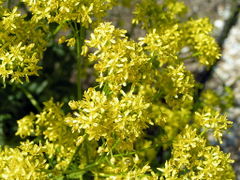
|
 |
Ancient war paint in fight against breast cancer
Aug 14, 2006, 13:20, Reviewed by: Dr. Priya Saxena
|
|
Glucobrassicin has shown an active role in flushing out cancer-causing chemicals including derivatives of estrogen. Women with higher levels of this hormone are at an increased risk of developing breast cancer
|
By Society of Chemical Industry,
A plant that gave ancient Britons and Celts their blue war paint, has been found to be a rich source of the anti-cancer compound, glucobrassicin, traditionally associated with broccoli. Glucobrassicin has been found to be effective against breast cancer. The war paint, a blue dye, is obtained from Woad, a member of the Brassicaceae family.
Stefania Galletti and her team at the University of Bologna, Italy, found that the plant contains twenty times more cancer fighting chemical glucobrassicin than its relative, broccoli, which they enhanced to nearly 65 times using various treatments. This compound plays a defensive role in plants, and the researchers found that wounding the leaves can increase levels by 30%. When leaves are damaged, for example, by insects, glucobrassicin is released as a defence mechanism. Its derivatives can kill some plant pests, and also appear to have anti-tumoral properties, and are particularly effective against breast cancer.
Glucobrassicin has shown an active role in flushing out cancer-causing chemicals including derivatives of estrogen. Women with higher levels of this hormone are at an increased risk of developing breast cancer.
 |
| Woad Flowers |
There have been many reports on the health benefits of broccoli and other commonly consumed vegetables from the same family. However, it has been difficult to extract enough of the broccoli compound to carry out extensive tests. Galletti's team hope that by using this cheap, rich source, in depth research can be carried out to study how this compound acts in the body. 
- Journal of the Science of Agriculture DOI: 10.1002/jsfa.2571
sci.mond.org
For any corrections of factual information, to contact the editors or to send
any medical news or health news press releases, use
feedback form
Top of Page
|
|
|
|